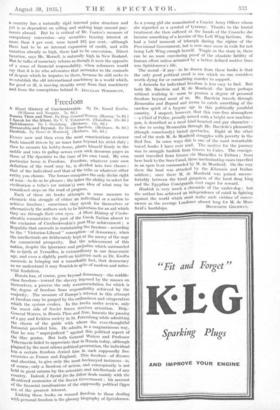Freedom
A Short History of Czechoslovakia. By Dr. Kama Krofta: (Williams and Norgate. 7s. 6d.) • EvEnY now • and then even the most conscientious reviewer finds himself driven by an inner force beyond his strict duty ; then he mounts his hobby-horse, plants himself firmly in the saddle and tries tO gallop across even such decorous pages as those of The Spectator to the tune of his own Land. My own particular horse is Freedom. Freedom, whatever your own definition of tile word may be, is • divided into two classes : that of the- individual. and that of the tribe or whatever other entity you choose. The former comprises the only divine right of roan—to do as he pleases ; the latter the ability to select for civilisation a tribe's (or nation's) 'own idea of what may be considered steps on the road of progress. Each of these six books attempts m some measure to chronicle this struggle of either an individual or a nation to • achieve freedom ; sometimes they speak for themselves or alternatively the authors seek to be historians for an aid which they see through their own eyes. A Short History of Czecho- Slovakia romanticises the past of the Czech Nation almost to the exclusion of Czechoslovakia's post-War achievement ; a Republic that succeeds in maintaining the freedom—according to the Victorian-Liberal " conception—of democracy, when ."
the intellectuals are deliberately kept at the mercy of the urge for commercial prosperity. But the achievement of this nation, despite the ignorance and prejudice which surrounded its re-birth at Versailles, is extraordinary in our demccratic age, and even a slightly partisan historian such as Dr. Krofta succeeds in bringing out a remarkable fact, that democracy as we understand it may flourishiu spite of modern and indus-, trial feudalism. Russia has, of course, gone beyond democracy—the middle- class freedom—toward the slavery imposed by the masses on themselves, a process the only recommendation for which is the , degree of freedom from . responsibility achieved by the majority.. The measure, , of ,Europe's interest in this attempt, at freedom may be gauged by the-enthusiasm and-vituperation which the „system evokes. In the ,books. under review, only the worst side of Soviet forces receives attention. Brig.- General Waters, in Russia Then and Now, laments the passing of a gay and feckless society in St. Petersburg while admitting the charm. of the. guide with whom the ever-thoughtful Intourist provided: him. He admits, in a magnanimous way, that he was " unprejudiced ", against this political aspect of the, Slav genius. But both General- Waters and Professor trehternavin failed to. appreciate that in Russia today, although Plagued.by the most odious political persecution, the individual . has„ a certain freedom denied him in such supposedly free countries as France and England. This freedom—of divorce and abortion, to give. only the most hackneyed instances—is, a freedom, of. action., and consequently is not. of course,: only. held in great esteem by the•!seientists and intellectuals of any Speak for country. Indeed; .1 the. Silent deals mainly with the 111-oidered economics of the Soviet Government ; his account of the financial ramifications of the. supposedly political Ogpu are. of, the greatest interest. Linking those books on massed freedom to those dealing , With personal freedom is the gloomy biography of Spiridonova. As a young girl she assassinated a Czarist Army Officer whom she regarded as a symbol of tyranny. Thanks to the brutal treatment she then Suffered at the hands of the Cossacks she became something of a heroine of the Left Wing factions. She had a brief moment' of triumph 'during 'the regime of the Provisional Govemment,but is now once more in exile for not being Left Wing enough herself. Tragic as the story is, there can be no more convincing proof of the absolute futility of human effort' unless actuated by a better defined motive than was Spiridonova's life. • The' moral—if any---to be drawn from these books is that the only good political creed is one which no one considers worth dying for or committing murder to support. A formula for individual freedom is less easy to find. But both Mr. Baeirlein and MI de Monfreid—the latter perhaps without realising it—seem to possess a degree of personal freedom beyond most of us. Mr. Bacrlein travels through Bessarabia and Beyond and seems to catch something Of the careless spirit of a bygone age in this politically youthful country. I suspect, however, that this care-free atmosphere —a Chief of Police, proudly armed with a bright new machine- gun, is described as a most kind-hearted and gay character-- is due to seeing BesSarabia through Mr. 13acrlein's pleasantly (though consciously). tinted spectacles. Right' at the other end of the scale M. de Monfreid struggles with poverty in the Red Sea. In some ways this is one of the most reMarkabIe travel books I have ever read. The motive for the journey was to smuggle hashish from Greece to Cairo. The consign- ment travelled from Greece' via Marseilles to Eritrea ; from; here back to the Suez Canal, those' incriminating cases travelled in an open boat commanded by M. de Monfreid. On the way there the boat was attacked by the Khennsin and Italian soldiers ; once there M. de Monfreid was poised uncona.: fortably between the hired gangsters of the local drug king and•the Egyptian Coastguards ever eager for reward. Hashish is very Mitch a chronicle of the' Under-dog ; birt the author has achieved ail independence of mind in fighting against the world which' Must Make such victims of con, nience as the average Londoner almost long for M. de Mon+.


































 Previous page
Previous page